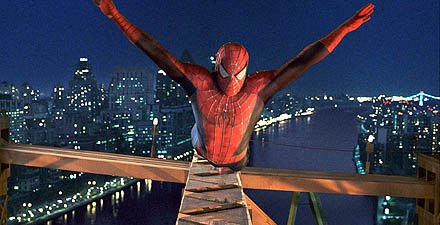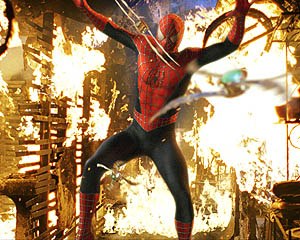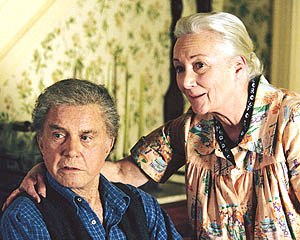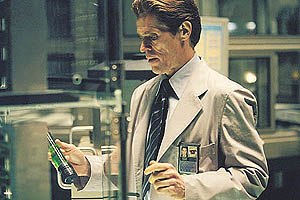Surprised that Spider-Man is racking up such huge sums at the box office? Danny Fingeroth isn't, as he explains, there's a little Spidey in all of us.

Spider-Man and the other early 1960s Marvel Comics were the first to be set in real cities like New York rather than a pseudonymous Metropolis or Gotham City. All images © 2002 Columbia Pictures. All rights reserve
In the early 1960s, Marvel Comics' Stan Lee and his artistic collaborators, most prominently Jack Kirby and Steve Ditko, came up with a unique hybrid of kid-friendly adventure and grown-up character development that revolutionized comics and, to a large degree, all popular media. It's a hybrid that's in successful use to this day.
Strangely, movies such as Star Wars and TV shows such as Buffy the Vampire Slayer long ago realized that if you combine soap opera, science-fiction and the right kind of humor, you'd have the essence of a Marvel-style story. But when it came to adapting the template to films based on the comics themselves, movie studios always got gun shy, and decided that no sizable audience could possibly take a comic book-based superhero story seriously. This kind of thinking led to self-parodying movies that lost the underlying thematic truths that sparked the characters.

Spider-Man (Tobey Maguire) and Mary Jane Watson (Kirsten Dunst) become this generations Romeo and Juliet.
The Spider-Man, Batman, Batman Beyond and Justice League cartoons got it, and get it, right. And the first Superman and Batman movies had great moments of drama, humor and action. But feature filmmakers always seemed embarrassed about taking the material seriously. For whatever the reasons, though Star Wars, Star Trek, Buffy, Dark Angel and many other movies and TV shows not based on specific comics characters had the Lee/Kirby/Ditko Marvel spirit, feature films based on superhero properties that are completely true to the properties' spirit have just started to be made. The X-Men movie and the two Blade movies come to mind. But it turns out that they were just warm-ups for Spider-Man.

Peter Parker (Tobey Maguire) improves upon his first attempt at costume-making.
FinallyThey Got It Right
Yes, after decades of trying to figure out how to make popular comics franchises acceptable to mainstream movie audiences as well as to dedicated fans, Hollywood has finally figured it out. Don't change the material. Don't dilute it. Don't satirize it. Don't condescend to it. Keep it true to itself.
Apparently, based on the first weekend box office -- over 114 million smackeroos in gross receipts -- a lot of people feel that way.
Tobey Maguire is perfect as harried, soulful, misunderstood nerd, Peter Parker. Kirstin Dunst embodies Mary Jane, switching from her serious persona when she's (sincerely) emoting with Peter, to carefree party girl when her friends show up to grab her for a night on the town.
The movie's plot, which is essentially the origin of Spider-Man and the Green Goblin and their first battles, is a classic coming of age story. A "regular-guy" teen is given enormous power. What does he do with it? Does he cash in, show off, fight crime -- or is he tempted to become a criminal? What does it say about this person that he makes the choices he does? Would we do the same thing in his place? And how does he deal with other powerful people who make drastically different choices about how to use their power?

For every super-hero, there must simultaneously arise a super-villain of equal might: Norman Osborn, The Green Goblin (Willem Dafoe).
It Could Be Us
The comics' and movie's origin of Spider-Man is part of our national pop culture collective memory. Not as familiar, perhaps, as the Superman or Batman origins, it nonetheless hits us where we live. You don't have to be a strange visitor from another planet to be Spider-Man. You don't have to inherit billions of dollars and train to the peak of human physical and mental perfection. All you have to do is get bitten by a radioactive (or, in the movie, genetically modified) spider.
It could happen.
In a way, it does happen. To all of us. Well, not the spider-bite. But in everyone's life, something opens our eyes to the fact that the world has possibilities -- both good and bad -- we never imagined. That the object of our passions may be as shy about expressing them as we are. That everyone thinks they're weird. And we discover that when people realize these things, they sometimes get arrogant and reckless and self-involved. That's what becoming an adult is all about. That's the real hook of Spider-Man.

Spidey must be hoping that his new super-powers include flameproofing.
Peter Parker does "something wrong. Once." (To quote Burt Lancaster in The Killers.) And that one selfish act, committed by an otherwise open-hearted and generous person, results in a loss that will haunt him forever. That is the fear we all live with: that no matter how careful we are, we will make one mistake that will ruin everything. That is where we identify most with Peter. We've all made critical mistakes, usually -- but not always -- reparable. In most cases, no one dies because of them. But we all come close to that edge. Peter falls off of it.
For him, his newfound spider-powers are the key to redeeming himself in his own eyes for a "sin" no one else but he thinks he committed, but for which he can never forgive himself.

Good makeup? Good casting? Uncle Ben (Cliff Robertson) and Aunt May (Rosemary Harris) look exactly like Steve Ditkos original comic book art portraits.
The most enduring heroic narratives, from the Bible to the Greek Myths to the archetypal comics heroes -- Superman, Batman, Spider-Man -- deal with loss of family, discovery of power, the journey from helplessness to mastery, and learning how to best use that mastery. "With great power comes great responsibility," is what Peter's Uncle Ben tells the young man shortly after he gets his spider-powers. That's a lesson Peter learns the hard way, as do we all. Learning it is what makes him a hero. The Green Goblin, played by Willem Dafoe, also has great power. But his sense of responsibility is only to himself. His supposed family loyalty is just an excuse to abuse power. In a role that echoes, both in dialogue and in gesture, Brando, Pacino and DeNiro in the Godfather films, with a little Darth Vader thrown in, Dafoe ably fills the role of Norman Osborn, madman industrialist. As Osborn's alter ego, the Green Goblinwell, to me, that's the movie's weakest point. The costume does all the acting -- or non-acting -- when Dafoe (or whatever stuntman) is in it.

The Green Goblin raining on his own companys parade.

Industrialist Norman Osborn is not the first super-character to gain fantastic powers from an experimental formula, and he will not be the last.
Action, Action, Action
That's the weirdest thing about the movie. Much of the time, the film's two antagonists' faces are fully covered. When their faces are uncovered, though, especially in Maguire's case, they make it count.
Their climactic, final slugfest is just what you want to see in a super hero-super villain battle. Which of the two is technically stronger? Who's tougher? They're actually pretty evenly matched. But the strength of the script, performances and message of Spider-Man, in whatever incarnation, is that quality of character trumps hate and power. And, for the two hours we're in the theater, or the twenty minutes we're reading a well-crafted comic, we believe it to be true. We don't think, "Gee, what cool effects," or "How does he go to the bathroom in that suit?" We think, "I wish I was as good of heart as Spider-Man, seriously flawed though he may be."
Don't get me wrong. This isn't a Merchant-Ivory movie. While there's lots of human interest and philosophical reflections on life, there's also lots of (very originally staged) action. There are also many authentic New York sets. (Spider-Man is as much a love poem to New York as any Woody Allen film.) There are loads of jokes and quips, both for Spidey-geeks and for those who wouldn't know Spider-Man from the Roto-Rooter Man. There are also many touching moments that transcend genre.
And of course, there's much punching and hitting in, to coin a phrase, the Mighty Marvel Manner.
Just Plain Fun
Significantly, and always the message of the comics as well as the movie, is that, at the end of the day, after all the grief and battling and angst, it's still fun to be Spider-Man. Face it -- we've all got our own problems. But only Peter Parker gets to deal with his by swinging though the concrete canyons of New York on silken strands of webbing.

The Green Goblin menacingly emerges from just one of the destructive blasts his high-tech weapons cause.
Could I nit-pick things about the movie? Sure. The Goblin suit. The carjacking. (I know they happen in New York, too, but it feels to me like a California thing.) Not getting the power/responsibility line exactly right. "With great power there MUST ALSO come great responsibility," is how it goes. The much-debated "organic" web-shooters. (While they worked better in the movie than I ever dared hope, I still would rather have had them be mechanical.) Peter not using his scientific know-how to solve any major problems. But, like I said, they're nit-picks. You'll no doubt have your own. You get that right when you pay your nine bucks.
Bottom line: Spider-Man is tons of fun. It's the best super hero movie ever made.
Danny Fingeroth was group editor of Marvel Comics' Spider-Man editorial line when Jim Cameron's "scriptment" for a Spider-Man movie arrived on his desk. He's been waiting ten years for the movie to get made. After Marvel, Danny was a creative executive at Virtual Comics and Visionary Media (home of WhirlGirl). Currently, he's writing for Platinum Studios (producers of the Men in Black movies) and Rosen Book Works, among other companies. Be on the lookout for Write Now!, the new magazine about writing for comics, animation and science-fiction that Danny created and is editing for TwoMorrows Publishing. The first issue, due out this summer, features interviews with Stan Lee, Brian Michael Bendis, Joe Quesada, Tom DeFalco, J.M. DeMatteis and Mark Bagley.







